Search Results
Showing results 21 to 40 of 75

Falling Faster
Source Institutions
In this activity about gravity (page 6 of the PDF), learners will come to understand how all objects will fall at the same rate, but that air will slow things down.
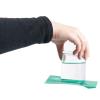
Gravity-Defying Water
Source Institutions
In this activity, learners explore gravity and air pressure as they experiment with holding a glass full of water upside down, without spilling it, using a simple piece of cardstock.

Crunch Time
Source Institutions
In this quick and easy activity and/or demonstration, learners use two empty 2-liter bottles and hot tap water to illustrate the effect of heat on pressure.

Balloon in a Bottle
Source Institutions
In this physics activity (page 3 of the PDF), learners will see firsthand that air takes up space and has pressure by attempting to inflate a balloon inside of a bottle.
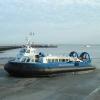
Hover Cup
Source Institutions
Is this activity concentrating on physical science, learners build their very own miniature hovercraft out of a paper cup. Using it, they can explore the concepts of friction and force.
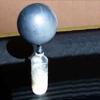
Yeast-Air Balloons
Source Institutions
In this activity, learners make a yeast-air balloon to get a better idea of what yeast can do. Learners discover that the purpose of leaveners like yeast is to produce the gas that makes bread rise.
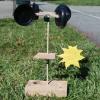
Weather Vane and Anemometer
Source Institutions
In this meteorology activity, learners construct simple devices to measure the direction and speed of wind.
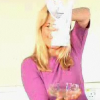
Waterproof Hanky
Source Institutions
In this physics demonstration, learners will be surprised when a handkerchief holds water in an upside-down glass.
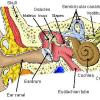
Model Eardrum
Source Institutions
In this activity (last activity on the page), learners make a model of the eardrum (also called the "tympanic membrane") and see how sound travels through the air.

Vibrating Pennies
Source Institutions
Conduct a simple experiment to explore how temperature changes can make things expand or contract.
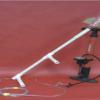
Handheld Water Bottle Rocket & Launcher
Source Institutions
In this activity, learners build handheld rockets and launchers out of PVC pipes and plastic bottles. Use this activity to demonstrate acceleration, air pressure, and Newton's Laws of Motion.
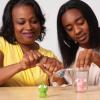
Molecules in Motion
Source Institutions
"Molecules in Motion" explores how materials behave and change in a vacuum.
Test Your Lung Power
Source Institutions
In this activity, learners try to blow up a balloon hanging inside of an empty bottle.
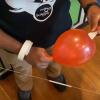
Balloon Rockets
Source Institutions
In this activity, learners will create a model rocket out of an inflated balloon attached to a straw on a taught string.
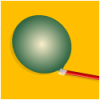
Rocket Pinwheel
Source Institutions
This is an activity about motion, power, air and Newton’s Third Law of Motion, which states that for every action there is an equal and opposite reaction.
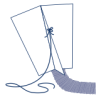
Go Fly a Kite
Source Institutions
In this hands-on activity, children create their own kites that can fly indoors. Learners are exposed to basic concepts of gravity and air resistance.

Crazy About Kites
Source Institutions
In this activity, learners build a kite out of paper, change it, and try to make it fly even better. With their new knowledge of kite making, students can then go on to create their own kite designs.
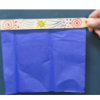
Draft Detectives
Source Institutions
In this two part activity, learners become draft detectives by constructing their own draft catchers to detect drafts around windows or doors.

Static Electricity
Source Institutions
In this activity, learners will explore ways static electricity interacts with the surroundings of an object. The activity has step-by-step instructions in English and Navajo.

Snake Kite
Source Institutions
In this activity, learners will explore the physics of air by making a snake kite.
